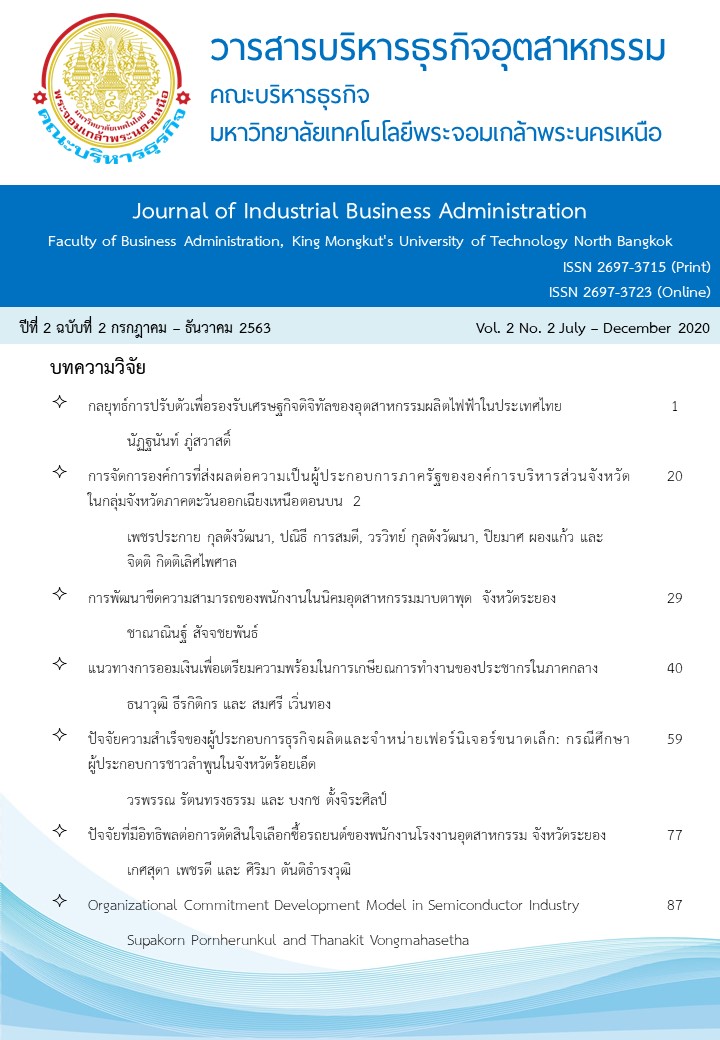Key Success Factors of Entrepreneurs in Small Business of Furniture Manufacturing and Distribution: Case Study the Lampoon Entrepreneurs in Roi Et Province
Keywords:
Key Success Factor, Entrepreneur, FurnitureAbstract
The aim of this research is to study the factors that affect to the success of small furniture manufacturing and distribution business. The concept of success factor of small business entrepreneurs and the exchange theory was applied in this research. The data collected from entrepreneurs of Lamphun people in Roi Et Province. The specific method was used as a sample selection method corresponding to the research objectives. The successful business was chosen as sample group by applying the balanced scorecard as a success indicator in business success. From the data collection from 3 firms of samples using the semi-structured interviews, the results indicated that the factors of success of Lamphun entrepreneurs in Roi Et Province consisted of 3 main factors. 1) For the Entrepreneurs’ psychological and personality traits, the result showed that the entrepreneur has the knowledge and past experience in the furniture business. They get involved in every step of the operation process such as selling products, delivering products, manufacturing products, and repairing machines. There are a variety of customer service methods based on honesty in business operations. 2) For Entrepreneurs’ managerial skills and training, it was found that the entrepreneur were planned and operation control in various areas such as giving the opportunity to the employees to be participated in the purchase of raw materials, pay the earning as a lump and allowed them to withdraw the wages every day and the employer have a brotherly relationship with employees and provide the employees welfare. The entrepreneur always talked friendly with customers, focus on producing high-quality products that meet customer needs, not adding too much profit, and can also negotiate the price. Moreover, the location is suitable for the furniture production but it quite far away from customers, the entrepreneurs solved the problem by bringing products to customers using the peddling method. 3) the external environmental factors result indicated that the entrepreneurs have a dependence on each other in the Lamphun family group in terms of money or other and they joined into the Northern in Roi Et association for social return activities.
References
สำนักงานสถิติจังหวัดร้อยเอ็ด. (2561). รายงานสถิติจังหวัดร้อยเอ็ด พ.ศ. 2560. [สืบค้นวันที่ 16 สิงหาคม 2563]. จาก http://www.oic.go.th/ fileweb/cabinfocenter38/drawer023/general/data0000/00000069.Pdf
Daniel, D. R. (1961). Management Information Crisis, Harvard Business Review, Sept.-Oct. 111-121.
Zimmerman, M. A. and Chu, H. M. (2013). Motivation, Success, and Problems of Entrepreneurs in Venezuela. Journal of Management Policy & Practice. 14(2), 76-90.
Pratt, V. (2001). Sharing Business Skills in Kenya. Center for International Private Enterprise, Washington D.C., USA.
Kaufman, R. (2013). UP! Your Service is now UPLIFTING SERVICE. Retrieved August 26, 2020, from https://ronkaufman.com /building-a-service-culture/up-your-service-is-now-uplifting-service/
Chu, H. and Szabo, B. (2005). Hungarian and Romanian Entrepreneurs in Romania - Motivations, Problems, and Differences. Journal of Global Business, 16, 77-87.
Sy, H. (2009). Henry Sy's Keys to Success. Retrieved August 28, 2020, from https://ezinearticles.com/?Henry-Sys-Keys-to-Success&id=3371242
Benzing, C., Chu, H. M. and Callanan, G. (2005). Regional Comparison of the Motivation and Problems of Vietnamese Entrepreneurs. Journal of Developmental Entrepreneurship, 10, 3-27.
Coy, S. P., Shipley, M. F., Omer, K. and Rao, N. A. (2007). Factors Contributory to Success: A Study of Pakistan’s Small Business Owners. Journal of Developmental Entrepreneurship, 12(2), 189-198.
Chu, H., and Callanan, G. (2005). Regional Comparison of the Motivation and Problems of Vietnamese Entrepreneurs. Journal of Developmental Entrepreneurship, 10, 3-27.
Benzing, C., Chu, H., and Kara, O. (2009). Entrepreneurs in Turkey: A Factor Analysis of Motivations, Success Factors, and Problems. Journal of Small Business Management, 47(1), 58-91.
Ghobadian, A., and O’Regan, N. (2006). The Impact of Ownership on Small Firm Behavior and Performance. International Small Business Journal, 24(6), 555-586.
Martins, T. A. (2013). 10 Challenges & Problems of Starting a Business + Lessons I Learned. Retrieved August 28, 2020, from www.mytopbusinessideas.com/ challenges-of-starting-a-business
Kozan, M. K., Oksoy, D. and Ozsoy. O. (2006). Growth Plans of Small Business in Turkey: Individual and Environmental Influences. Journal of Small Business Management, 4(11), 114–129.
McGee, C. (2007). Ghanaian and Kenyan Entrepreneurs: A Comparative Analysis of Their Motivations, Success Characteristics, and Problems. Journal of Developmental Entrepreneurship, 12(3), 295–322.
Strauss, A. L. and Corbin, J. M. (1998). Basics of Qualitative Research: Techniques and Procedures for Developing Grounded Theory. Sage Publications, Thousand Oaks, CA.
Downloads
Published
How to Cite
Issue
Section
License
Copyright (c) 2020 วารสารบริหารธุรกิจอุตสาหกรรม

This work is licensed under a Creative Commons Attribution-NonCommercial-NoDerivatives 4.0 International License.



